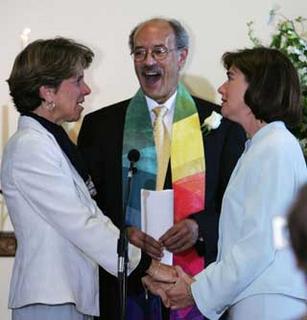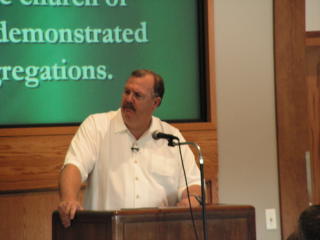This was the Friday night message at the Lombard Conference. Dr. Revis is the Executive Minister of the ABC of the Northwest.What It Will Take to Become a Missional MovementCharles Revis September 22, 2005
I would bet that there’s not one of us who caught a plane or car to this event that hasn’t pondered long and hard about the question, “Where do we go from here?” “What are we to become?” “Can it really make a difference for our future together?”
There has been much discussion on message boards and in telephone conversations about this very subject. And, more has taken place today. We have our work cut out for us. Yet, I am encouraged.
I believe the most important place to start is to be clear about mission. Without clarity of purpose and calling we will drift aimlessly, and there will be little energy for starting this new work.
We must be birthed in mission, remain focused on mission, and guard the integrity of this mission, or else we have no reason to start a new organization.
Now, having said that, such a mission must be defined by the clear directives of scripture. It must be biblical, concise and compelling. It should be like a “song in the heart” that calls us to mutual action. All for the sake of the Gospel.
In fact, more than important than anything else, this mission should result in a mighty advance of the Gospel, first and foremost. So, before we go any further we must talk about that, the Gospel.
1. To become the missional movement that God desires we must be clear about the nature of the Gospel.
To comprehend the true essence of the Gospel we must turn to the Scriptures. Apart from the guidance of Scripture we can confuse the nature of the Gospel, replacing it with many well-intentioned, human-centered works that are powerless to save. As one person has said, “The world has many religions, but only one Gospel.”The scriptures taken on face value leave no doubt about the true nature of the Gospel.
First of all the Gospel is rooted in our Savior’s own declaration, “For God so loved the world that he gave his one and only Son, that whoever believes in him shall not perish but have eternal life. For God did not send his Son into the world to condemn the world, but to save the world through him. Whoever believes in him is not condemned, but whoever does not believe stands condemned already because he has not believed in the name of God’s one and only Son.” John 3:16-18
The Gospel informs us that sin has separated each of us from a holy God leaving our souls in a precarious position.
The fact that our sins have condemned us is underscored by Paul when he wrote, “For all have sinned and fall short of the glory of God”. (Romans 3:23) and again when he wrote,
“For the wages of sin is death, but the free gift of God is eternal life through Christ Jesus our Lord.” (Romans 6:23)
This Gospel found in the Scriptures reveals that we have a Father in heaven who loved us so much that He sent His only begotten Son to die for each of us.
This Gospel of the Scriptures declares that in His death Jesus took upon Himself your sin, my sin, and the judgment of a Holy God against our sin.
This Gospel announces that this Savior was resurrected in victory demonstrating His power over sin and its consequences: death and the judgment of a holy God. Jesus is the Victor over Satan. In that resurrection there is proof of His authority to declare, “Your sins are forgiven.” He has bought us with a price, and that gives Him authority to command, “Go and sin no more.”
This is a Gospel that not only convicts of sin, but offers incredible hope in this life, and for the life to come.
When I personally fell under conviction as an eight year old child, I cried out to Jesus for forgiveness, invited Him into my heart to be my Savior, then that same Jesus, the resurrected Christ, washed me and cleansed me, and adopted me as His child forever.
My Holy Father and my Savior Jesus Christ seated me in the heavenlies, baptized me with the Holy Spirit and set my feet on a path of discipleship and service that would never end until I am transferred from this life into the realm of the new heaven and new earth upon the return of Jesus Christ in Glory.
This is the Gospel, the Good News revealed in the Bible and passed down from generation to generation of believers. It is this Gospel that brings new life to each person who calls on the name of the Lord.
T.S. To be the missional movement that God desires we must be clear about the nature of the Gospel, and that Gospel is revealed to us in the Scriptures.
2. To Become the Missional Movement God Desires We Must Believe this Gospel Has the Power to Change the World.
This is the Gospel that transforms people into new creations. These new creations reproduce themselves as they proclaim the Gospel to others. The Holy Spirit forms these new creations into a new community, and God compels this new community to turn the world upside down through the life-changing power of Jesus Christ.
There are several reasons American Baptists evangelicals have balked at accepting homosexual practice as normative. Besides the obvious teaches of scripture, to affirm homosexual practice is to deny the life-transforming power of the Gospel. Jesus is in the life-changing business, and we should be too.
A great American Baptist theologian once pointed out that life-changing power is an essential evangelical conviction in his book The Evangelical Heritage. Bernard Ramm wrote:
“The evangelical believes that the real touchstone of a theology is its spiritual power not necessarily its intellectual shrewdness, or sophistication, or learning.”
Ramm proceeds to point out that this power is first the power of the message to make true converts to Jesus Christ. The message preached must have the power to cause people to be born anew.
The second meaning of this power is that it must result in the creation of a genuine new life in Christ. New creations live lives distinct from their former old creation lives. These new creations give birth to a new community, and this new community attracts people to the Savior like moths to a bright porch light shining on a dark summer night.
An evangelical Gospel expects these new converts to make spiritual progress that becomes visible through a demonstrable righteousness. As Paul wrote, “we who with unveiled faces all reflect the Lord’s glory, are being transformed into his likeness with ever-increasing glory, which comes from the Lord, who is the Spirit.” 2 Cor 3:17
Dr. Ramm summarizes his advocacy for “transformational power” as a key component in an evangelical theology with these words:
“Evangelical theology attempts to be a theology of power. It does want the Word, but it also wants the Spirit. It wants exposition, but it also wants application. It wants understanding, but it also wants transformation. It wants academic excellence, but it also wants spiritual excellence.”
This Gospel of radical conversion and transformation is the Gospel that has been lost at the center of our life together as American Baptists. It is the Gospel that once drove Baptists to Burma, to Thailand, to Central America and to the Congo . For our forbearers believed there were people in those lands who were lost, and would remain lost, unless someone brought them the glorious message of salvation in Jesus Christ.
This is the Gospel that propelled the Home Mission Society to send out home missionaries to California, Oregon, Washington, Montana, Idaho and Utah .
What happened to that spirit? That missionary spirit which would not rest until it pressed forward into new harvest fields? It was lost because we lost the essence of the Gospel. We lost the conviction that Christ has come into this dark world to save and transform all people. We lost our passion for the Gospel as grounded in the unchanging truths of the Bible, and the historical fact of our Savior’s death on the cross and His subsequent bodily resurrection.
Today if you traverse the environs of Salt Lake City , Utah you will find only seven American Baptist Churches. Only one of these is healthy. One of our Utah pastors told me a few months ago that he remembers the day when there were 28 to 35 ABC related preaching stations and churches in the Salt Lake area.
T.S. To become the missional movement God desires we must recover our passion for the Gospel, the Good News that has power to change the world.
3. To Be the Missional Movement God Desires We Must Believe that Sharing this Gospel Is Job Number One.
The proclamation and dissemination of this life-changing Gospel is Job Number One. When we are giving ourselves away in the service of this Gospel it breathes life into believers, and churches. When the proclamation of the Gospel slips to second place, or third, or worse yet, is relegated to a job on a committee job description, then the church begins to die.
Yes, I know there are several important, non-negotiable purposes of the church. Worship. Community. Discipleship. Teaching. Leadership development. Service. I’ve read Rick Warren, and I applaud him, and others, who help us recover the church’s God-given purpose.
But, I submit to you that winning the world for Christ, one person at a time, is Job Number One. What other purpose--even the top ones I’ve identified--was commanded by our Lord just hours before His ascension into Heaven?
Last words are important words, that’s why they are noted, even if sometimes they are rather ludicrous. For example:
As he lay dying in a drab Paris bedroom, Oscar Wilde’s last words were, "Either that wallpaper goes, or I do.”
Just before he died Douglas Fairbanks said, "I've never felt better.”
These last words were pronounced by a man who was executed by electric chair in New York in 1928, "Well, gentlemen, you are about to see a baked Appel.” His name was George Appel.
And, then there was W.C. Fields who said during his last illness, "I have spent a lot of time searching through the Bible for loopholes.”
“You can be a king or a street sweeper, but everyone dances with the Grim Reaper." — Robert Alton Harris, executed in California's gas chamber, 1992.
Actually, final instructions carry a lot of weight, especially when they are the words spoken by the second person of the Trinity. That’s why we pay special attention to them.
Remember Jesus’ last words:
“Therefore go and make disciples of all nations, baptizing them in the name of the Father and the Son and the Holy Spirit, teaching them to obey everything I have commanded you.” (Matt 28:19)
“But you will receive power when the Holy Spirit comes on you; and you will be my witnesses in Jerusalem, and in all Judea and Samaria, and to the ends of the earth.”(Acts 1:8)
These essential, fundamental directives coupled with the expulsive power of the Holy Spirit given on the Day of Pentecost formed the followers of Jesus Christ into a MISSIONAL PEOPLE, and continue to do so today when we seek to obey them.
The church can only be a healthy and obedient church as it yields to the Spirit’s lead in continuing the work and mission of Jesus Christ. The head of the church, Jesus Christ, came declaring His life’s purpose: “I have come to seek and to save the lost.”
In Pentecost we have confirmation that Christ Jesus, as head of the church, directs His body to continue fulfilling His life’s purpose. The church, then, is an incarnational presence of Christ continuing the mission and ministry of God in Christ.
When the church is out of sync with the Head, it declines, fades away into non-existence, primarily because it has abandoned the mission of its Head. As someone has said, “A church that isn’t a missionary church will soon be a missing church.”
So we could say that Mission both precedes and creates the church.
Or, as Ray Anderson has written: “[It is] mission, rather than missions, [that] constitutes the ground of the church itself.” ~ Ray Anderson
Which calls to mind the words of Emil Brunner who said, “The church exists by mission as fire exists by burning.”
David Bosch explains it like this, “Mission was understood as being derived from the very nature of God….Father, Son and Holy Spirit sending the church into the world…a movement from God to the world:…There is a church because there is a mission, not vice versa.”
The church as a missional people obeying Jesus’ marching orders will not rest until the world is won. This missional imperative is the driving force of a healthy church. And, it must be the driving force of any new movement that God raises up.
In most cases when a church is missional at heart and in purpose it will find ways to join forces with other missionally centered churches. At one time we understood that we were a people “on mission together.” ABC interdependence was birthed in part to expand the mission of the local church beyond its own Jerusalem.
A solitary missional church will have a great impact on the world. Yet, that impact will pale as compared to a whole tribe of missional churches linking arms together in Christ with the intention to radically turn the world upside down for the cause of Christ.
Can you imagine the spiritual impact on this nation if hundreds of churches across the nation closed ranks and launched a cooperative missional movement to win the world for Christ? I’m calling on us to become this missional movement.
4. To Be the Missional Movement God Desires We Must Embrace New Testament Practices that Sustain the Movement.
So, if we find ourselves excited about the possibilities of a new missional movement composed of ABC-related folks, what guidelines for birthing the new movement should guide our trajectory?
What will sustain this movement towards full bloom?
I would suggest there are three streams that will inform us:
1) Recent new forms of connectionalism.
2) Historic Baptist patterns of associationalism.
3) Embracing the practices of the early church.
I don’t have time to delineate these to a sufficient level of detail. But, let me sketch out how each may inform how we organize this new movement.
1. New forms of connectionalism.
There is no doubt that we are living in a “post-denominational” age even though new denominations are birthing all the time. Most of us in this room are quite aware of the emergence of networks.
These are sleek (as in efficient), simple (as in flat structure), responsive (as in little bureaucratic red tape) and pragmatic (providing resources that emerge from hands-on ministries that meet specific needs). Whatever we craft together should operate more like a network than a denomination.
Lyle Schaller in his book, From Geography to Affinity, points out that churches are already in the habit of using the services of affinity networks. How many in this room have attended a conference hosted by the Willow Creek Association; launched a 40-Days of Purpose emphasis through Saddleback; conducted stewardship training through Dave Ramsey; grabbed your sermons off Sermon Central; downloaded a graphics worship piece off Sermon Spice, set your people free through the deliverance methods taught by Freedom in Christ; organized your small group ministry through one of the G-12 Cell Group ministries; learned conflict resolution through Peacemakers Ministry, and trained your leaders through CCN?
This is to say that we are already accustomed to identifying with multiple networks at the same time. The challenge for us is to launch a movement that will provide something fundamental that these others fail to provide. And, do it in the simpler, sleeker methods of a network, rather than in the form of a denomination.
T.S. So, what might this new missional network provide? One clue may be found in the original Baptist associations.
2. Historic patterns of Baptist Associationalism.
The Philadelphia Baptist Association was formed in 1707 and was an influential model for the next hundred years of Baptist life. Prior to the emergence of the over-emphasis on local church autonomy that arose in the 19th century the association was considered a fundamental expression of the Baptist concept of the church. There were two primary reasons for this.
First: our Baptist forbearers knew that an individual church in and of itself is an incomplete expression of the Body of Christ. The Body of Christ is always larger than any one local congregation. Individual churches in association gave visibility to this “invisible” reality.
Second, Baptist churches discovered that as they associated together they could accomplish more for the Kingdom of God. In fact, they were healthier in association, than as separate, isolated, stand alone congregations
Howard Stewart and Leon McBeth both inform us as to the power and function of the Association. Here’s a summary:
1. The provision of a duly qualified ministry for the churches. This association developed regulations and procedures for the recruitment, education, ordination, and placement of ministers.
2. The assoc. provided printed materials for the churches. Included in the standard publications were such items as a Confession of Faith, the Treatise of Discipline, a catechism, and a hymnal.
3. Home Missions, benevolent work, and struggle for religious liberty. The Philadelphia Assoc.
began by sending missionaries into Virginia as early as 1745. They also gave funds to destitute churches and financed the relief of widows.
4. Provided models for preaching. “Preaching was always a major feature of association meetings, and churches put forward their best preachers. The younger ministers, and the less capable, heard Baptist preaching at its best and learned thereby.” (McBeth)
5. The assoc. afforded the churches an opportunity to 'upbuild one another in love”. That is, the association provided fellowship for “lonely Baptists.” “In areas sparsely settled, with Baptists at best unpopular and at worst severely persecuted, the opportunity to share with others like-minded was important.” (McBeth)
6. Theological stability. When a church deviated from the accepted Confession of Faith, the Association stepped in to give a ruling. For example, in 1748 the Minutes of the Philadelphia Association indicate a censure was requested for those who denied the foreknowledge of God. In 1784, a church admitting unbaptized persons to the Lord's Table was the recipient of letters from sister churches exhorting a discontinuance of the practice.
7. The Association assisted local churches in solving various types of problems that they could not work out for themselves. They also spoke out on political and social issues. The Associations also provided Baptists a means of speaking and acting in unity on such matters as religious liberty, separation of church and state, slavery, and the use of intoxicating beverages.
T.S. These early associational practices provide clues for working together. Couple that with the practices of the early church, and the picture comes into focus.
3. Embracing the Practices of the Early Church As one observes the early church in Acts, and read Paul’s epistles, it becomes evident that those first churches were connected together, even though miles, cultures and nations separated them. Imagine doing Paul’s ministry without a computer, email, fax machine, cell phone, web site, Honda Accord, or Southwest Airlines. Give me a break! If any group of people had excuses for not connecting together they did. Yet, throughout Acts and the epistles there evidence that the churches were “together” in spite of the miles that separated them.
I wish to identify at least five ways they managed to connect together The last two chapters of Romans will be my main source, but these chapters are certainly not exhaustive.
1. They joined together for MUTUAL ENCOURAGEMENT and ACCOUNTABILITY. Romans 15:14, 15; 32, 33
Paul went from church to church encouraging them, bringing greetings from their sister churches, and addressing issues in the churches. Here is an example.
14I myself am convinced, my brothers, that you yourselves are full of goodness, complete in knowledge and competent to instruct one another. 15I have written you quite boldly on some points, as if to remind you of them again,… 32so that by God’s will I may come to you with joy and together with you be refreshed. 33The God of peace be with you all. Amen.
Paul gives the Roman church high marks. Look at his encouraging words! The letter does not seek to redress errors. Yet, Paul has written bold points to remind them again of certain essential truths of the faith that must not recede in their appreciation.
Yet, this is not a one-way street. Paul looks forward to his visit with the Romans and he describes it like a commercial for a soft drink (maybe Pepsi or Coke), only better: “together with
you [we will] be refreshed.”
There are a few of us who have such internal fortitude and drive that we can press on without encouragement. These are the energizer bunny leaders who just keep on keeping on. For the rest of us more mortal men and women, we’re more like nickel metal hydrides. We need to be regularly plugged in and charged up.
Paul was always sending a Timothy or a Tychicus or a Barnabas to encourage the church. No wonder he commands:
“Therefore encourage one another and build each other up, just as in fact you are doing.” I Thess 5:11
2. They joined together in SHARING RESOURCES. Romans 15:23-27
25Now, however, I am on my way to Jerusalem in the service of the saints there. 26For Macedonia and Achaia were pleased to make a contribution for the poor among the saints in Jerusalem. 27They were pleased to do it, and indeed they owe it to them. For if the Gentiles have shared in the Jews’ spiritual blessings, they owe it to the Jews to share with them their material blessings.
Paul was keenly intent on the Gentile churches sharing financial resources with the poorer believers in Jerusalem. Just as the Jerusalem church had shared their spiritual blessing with others, the Gentile churches return the favor by sharing their financial blessings. The churches shared resources with one another.3. They joined together in DEVELOPING and SUPPORTING LEADERS. Romans 16
Have you paid attention this list in Romans 16? I find it fascinating. Here is a long list of workers, apostles, and ministers that Paul recognizes as partners in the Gospel. Have you ever wondered where they came from? He, and others, developed them. Paul, and the other apostles, were devoted to the multiplication of leadership. Other evidence in scripture include these passages:
Paul and Barnabas appointed elders for them in each church and, with prayer and fasting, committed them to the Lord, in whom they had put their trust. Acts 14:23
The reason I left you in Crete was that you might straighten out what was left unfinished and appoint elders in every town, as I directed you. Titus 1:5
4. They joined together in MISSION (primarily in the form of church planting). Romans 15:18-20
18I will not venture to speak of anything except what Christ has accomplished through me in leading the Gentiles to obey God by what I have said and done—19by the power of signs and miracles, through the power of the Spirit. So from Jerusalem all the way around to Illyricum, I have fully proclaimed the gospel of Christ. 20It has always been my ambition to preach the gospel where Christ was not known,
Paul’s all consuming passion is to “lead the Gentiles to obey God.” Through preaching, service, displays of signs and miracles, and the power of the Holy Spirit; he has “fully proclaimed the gospel of Christ.”
If you were to join Paul at Starbuck’s for a Grande Triple-Shot Caramel Macciatto he would direct the conversation to this grand venture. Paul wouldn’t be interested in sport, news or weather. He would talk about sharing the Gospel! 23But now that there is no more place for me to work in these regions, and since I have been longing for many years to see you, 24I plan to do so when I go to Spain. I hope to visit you while passing through and to have you assist me on my journey there, after I have enjoyed your company for a while.
Now Paul sets his sights on Spain, the next mission field. He could have made his plans to go directly to Spain and by-pass the church in Rome. His mission theology, however, includes the church as strategic and instrumental for this mission. He writes to the Roman church to solicit their investment in this mission. If the Roman church joins him in this endeavor they will become his base of operation.
We would be wise to re-embrace this principle, that is, “go to Spain via the ‘nearest church!’” Go to New England and plant evangelical churches through the missional cooperation of this new movement we are birthing. Come to the Northwest and plant churches where more unchurched people live than any other place in America.
5. They joined together in PRAYER. Romans 15:30-31
30I urge you, brothers, by our Lord Jesus Christ and by the love of the Spirit, to join me in my struggle by praying to God for me. 31Pray that I may be rescued from the unbelievers in Judea and that my service in Jerusalem may be acceptable to the saints there,
There is no record of any revival in the world that was not birthed out of a concert of prayer. What would happen if we truly focused on prayer? Baptists have historically been people of prayer. What if we renewed our heart for being a missional movement through a renewed commitment to prayer? What might God do through us?
What if our prayers primarily focused on reaching the lost, on churches attempting a transition, on new churches that were being birthed?So, here you have it. A short list of how New Testament practices that missional people do together:
• Mutual encouragement and accountability
• Sharing resources
• Developing leaders
• Joining together in mission efforts
• Prayer
Story of Tim Brown and Clovis FBC. We have been so blessed by the help we received from our Region that we want to share that blessing with others. (Ministers Conference, Tools for the Trade, Ministered in two of our churches, and Intermountain Area coming up.)
Story of Vida, MT…Dan Purchase looking for partners, resources, prayer warriors, and co-workers to plant churches where there is no evangelical witness. We don’t have limited resources for helping him. Do any of you want to join him; I’ll help you make the connection!
These are the kingdom endeavors we can do together IF we are willing to join together and become a missional movement. It will require that:
• we agree on the nature of the Gospel
• believe the Gospel is nothing less than life-changing
• we demonstrate that sharing the Gospel is Job Number One
• we follow connectional, historical and scriptural practices for sustaining the movement as we launch it.
“If you want to build a ship, don’t drum up the men to gather wood, divide the work, and give orders. Instead, teach them to yearn for the vast and endless sea.” ~ Antoine de Saint-Exupery







